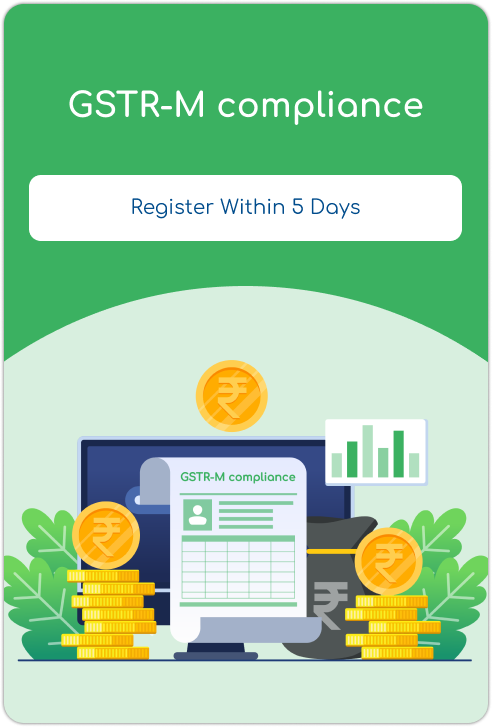
GST- Regular dealer Monthly Compliance
2130 customers
What will you get?
Monthly Filing GST-R1
Monthly Filing GSTR-3B
Monthly Reconciliation report
What do we Require?
INR 18463 Taxes As Applicable








Introduction
For a regular dealer, adhering to Goods and Services Tax (GST) monthly compliance and return filing is a critical aspect of maintaining regulatory adherence and smooth business operations. Each month, the dealer is required to meticulously record all sales, purchases, and input tax credits accurately in their accounting software or records. Introducing ProMunim of India, your comprehensive solution for seamless GST monthly compliance and return filing tailored specifically for regular dealers. Designed to streamline the intricate process of GST compliance, ProMunim empowers businesses to effortlessly navigate the complexities of tax regulations while ensuring accuracy and timeliness in filing returns.
Regular/ normal GST:
Regular GST is a registration type under GST, requiring suppliers of goods or services to obtain registration in the state or union territory where their aggregate turnover exceeds a specified threshold limit in a financial year. The threshold limit is Rs 20 lakhs / 40 lakhs, but in some states, it is reduced to Rs 10 lakhs. Taxpayers registered under regular GST must pay taxes monthly and file quarterly returns up to a turnover of Rs 5 crores, and monthly for businesses with a turnover above 5 crores.
Tax rates for regular Scheme:
The tax rates applicable under the Goods and Services Tax (GST) regime for regular dealers in India vary depending on the nature of the goods or services supplied. As of my last update in January 2022, here are the main GST tax rates applicable:
- Nil Rates:Some goods and services are exempt from GST, meaning they attract a tax rate of 0%. 5% Rate: This is the lowest rate applicable to essential items such as certain food items, healthcare services, transportation services, etc.
- 12% Rate:Goods and services falling under this category include processed food items, clothing, certain types of footwear, etc.
- A18% Rate:The majority of goods and services fall under this tax bracket, including household items, restaurant services, electronic goods, etc.
- 28% Rate:This highest GST rate is applicable to luxury items and certain goods and services considered as non-essential. Additionally, there are specific rates for certain items like gold (3%), rough precious and semi-precious stones (0.25%), and some items are subject to a cess over and above the GST rate, such as automobiles and aerated drinks.
It's essential to consult the latest GST rate schedules issued by the GST council or seek advice from a ProMunim’s tax professional as these rates may be subject to change over time due to government policies and amendments.
Advantages of regular Scheme:
- Input Tax Credit (ITC) Claim:Regular scheme registrants can claim ITC on GST paid on business purchases, reducing tax liability and improving cash flow management.
- Compliance Simplicity:A monthly return filing helps maintain regularity and simplifies compliance processes.
- Access to Larger Market:Registration allows businesses to operate across state borders, expanding customer base and market access.
- Legal Recognition:Regular scheme registration enhances businesses' credibility and reputation, leading to increased trust.
- Avoidance of Penalties:Compliance ensures businesses adhere to GST regulations, avoiding penalties and fines.
- Integration with Supply Chain:Streamlined flow of goods, reduced logistics costs, and improved operational efficiency.
- Export Benefits:Export benefits include refunds of input taxes paid on exported goods and services, promoting exports, and boosting foreign exchange earnings.
Disadvantages of regular Scheme:
- NComplex Compliance Requirements:Regular scheme registrants have to deal with complex compliance requirements, including maintaining detailed records, filing monthly returns, and adhering to stringent deadlines. This can be time-consuming and resource-intensive for businesses, especially small and medium-sized enterprises (SMEs) with limited administrative capabilities.
- Cash Flow Impact:Under the regular scheme, businesses are required to pay GST on a monthly basis, irrespective of their actual cash flow situation. This can lead to liquidity challenges, especially for businesses operating on tight margins or facing seasonal fluctuations in sales.
- Limited Input Tax Credit on Capital Goods:While businesses can claim input tax credit (ITC) on most purchases under the regular scheme, the availability of ITC on capital goods is limited. This can result in higher capital costs for businesses investing in machinery, equipment, and infrastructure.
- Increased Scrutiny and Audits:Regular scheme registrants are subject to increased scrutiny and audits by tax authorities to ensure compliance with GST regulations. This can be a time-consuming and disruptive process for businesses, diverting resources away from core operations and leading to potential disputes with tax authorities.
- Risk of Non-compliance Penalties:Failure to comply with the strict requirements of the regular scheme can expose businesses to penalties, fines, and legal actions by tax authorities. This risk is particularly significant for businesses with complex operations or inadequate internal controls.
- Competitive Disadvantage for Small Businesses:The administrative burden and compliance costs associated with the regular scheme can place small businesses at a competitive disadvantage compared to larger enterprises with greater resources and economies of scale. This can hinder the growth and sustainability of small businesses in the competitive marketplace.
Two options for filing returns:
- Under the monthly filing system:taxpayers must compile all sales and purchase data meticulously, ensuring accuracy in recording transactions. They prepare their GSTR-1 form, detailing outward supplies made during the month, and GSTR-3B, summarizing sales, input tax credits, and tax payable. Payments are made monthly, and returns are filed by the 10th and 20th of the following month, respectively.
- QRMP (Quarterly return monthly payment) scheme:This allows for quarterly filing of GSTR-1 while still requiring monthly payments of taxes. This scheme reduces the frequency of return filing but necessitates careful record-keeping and compliance throughout the quarter to ensure accurate reporting during the quarterly filing periods. Whether opting for monthly filing or the QRMP scheme, regular GST taxpayers must adhere to GST regulations, maintain detailed records, and file returns promptly to avoid penalties and maintain compliance.
How premium works for ensuring monthly GST return compliance for regular taxpayers:
"Premium" in the context of ensuring monthly GST return compliance for regular taxpayers would typically refer to advanced or enhanced services or tools that streamline and optimize the compliance process. Here's how premium services or tools can work for ensuring compliance:
- Automated Data Integration:Premium services may offer automated integration with accounting software or Mobile application systems used by businesses. This integration facilitates seamless data collection and organization, reducing manual effort and minimizing errors in data entry.
- Real-time Reconciliation:Premium tools may provide real-time reconciliation features that automatically match the data in the taxpayer's records with the corresponding data available in the GSTR-2A and GSTR-2B form. This helps in identifying discrepancies promptly and taking corrective action in a timely manner.
- Secure Filing:Premium services ensure secure and seamless filing of monthly GST-R1 and GSTR-3B returns through the GST portal, employing advanced encryption and authentication measures to protect taxpayer data and comply with data security standards.
- Customized Reporting:Premium services often offer customizable reporting features that allow taxpayers to generate detailed reports tailored to their specific business needs. These reports may include insights into tax liabilities, input tax credits, compliance status, and other relevant metrics.
- Compliance Alerts and Notifications:Premium services may include compliance alerts and notifications that remind taxpayers of important filing deadlines, upcoming tax payments, and changes in GST regulations. This helps taxpayers stay informed and proactive in meeting their compliance obligations.
- Expert Support and Guidance:We provide access to expert support and guidance from tax professionals who can offer personalized assistance with complex compliance issues, interpretation of GST laws, and resolution of tax-related queries.
- Secure and Seamless Filing:Premium tools ensure secure and seamless filing of GST returns through the GST portal. They may offer advanced encryption and authentication measures to protect taxpayer data and ensure compliance with data security standards.
- Audit Trail and Documentation:Premium services maintain a comprehensive audit trail of all compliance activities, including data entry, reconciliation, filing, and payment. This documentation serves as evidence of compliance in case of audits or inquiries by tax authorities.
Difference between Composition GST & Regular GST Schemes:
| Subject | Composition Scheme | Regular Scheme |
|---|---|---|
| Meaning | It is designed for small taxpayers whose turnover is up to certain threshold and dealing only with intra state sales. | It is for the taxpayers who don’t want to pay tax at fixed rates and dealing in intra state and interstate sales |
| Turnover | Supplier of goods/Restaurants- Rs 1.5 crores (Specified states-75 lakhs) Service providers- Rs 50 lakhs | Rs 20 lakhs/40 lakhs depending on the state and nature of business Refer GST Registration Thresholds |
| Intra State/Inter State sales | Can do only Intra State sales. Cannot make Inter State sales | Can make both Intra State/Inter State sales |
| SEZ/Exports | Cannot make SEZ Sales or exports | Can make SEZ or exports |
| Rate of Taxes | 0%, 1%, 2%, 5%, 6% | 0%, 5%, 12%, 18%, 28% |
| Input Tax Credit | Cannot claim Input Tax Credit | Can claim Input Tax Credit |
| Documents | Bill of Supply needs to be issued | Tax invoice needs to be issued |
| Returns | Quarterly payment of taxes and Returns in CMP-08 Annual Return- GSTR-4 | Return of outward supply GSTR-1 Returns of GSTR- 3B & Inward Supply GTR- 2A (Automatic) Annual Return GSTR-9 |
| Charge of GST | GST cannot be collected from customers. Need to pay from pocket | GST can be collected from customers |
| Entry/Exit | Can Opt out from composition at any time in any year | Cannot opt out of regular scheme any time. Can opt into composition during Feb-March every year |

